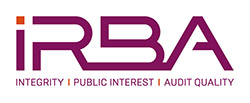The IRBA welcomes the introduction of the Financial Matters Amendment Bill with APA Amendments
|
Johannesburg, Thursday, February 7, 2019 – The Financial Matters Amendment Bill, which includes much needed amendments to the audit legislation, was introduced to the National Assembly by the Minister of Finance last week as an ordinary bill in terms of Section 75 of the Constitution. This week National Treasury briefed members of the Standing Committee on Finance (SCoF) on the key amendments to the five acts included in the amendment bill, following a public consultation process which started last year. Part of the draft bill relates to short-term amendments of the Auditing Profession Act 26 of 2005, aimed at strengthening the independence of the IRBA, strengthening the independence of auditors, increasing the powers of the IRBA to improve its efficiency in its investigation and disciplinary processes, and to introduce deterrents to undesirable behaviour by auditors. These measures will contribute significantly to public protection. The bill is now officially in the parliamentary process to enact legislation. Says Bernard Agulhas, CEO of the IRBA: “The IRBA is pleased with the support that the proposed amendments have received thus far. This was not unexpected, based on the huge reputational damage caused to a highly trusted profession by a few errant auditors. “The regulator, together with the profession and other role players such as audit committees and others charged with governance, are working tirelessly on restoring confidence in the profession, and the proposed amendments will go a long way in rebuilding the public trust which, in turn, will stimulate investment. “The amendments come at a critical time when attempts to regain confidence from the public and investors, and the prevention of further losses of hard-earned savings, can no longer be compromised.” The comment period on the amendment bill is currently open and the draft bill is available on the National Treasury’s website. SCoF has provided opportunity for comment on the bill with a public hearing scheduled for Tuesday 12 February, as per the latest timetable. Interested parties should reply to the committee secretary by 8 February. Ends Notes to the Parliamentary Process for Section 75 Bills:
Note: While both Houses must consider Bills that do not affect the provinces, the NA may actually override the NCOP and pass the Bill despite opposition by the NCOP. It then submits the Bill, either in its original form or with amendments, to the National Assembly with a report. A high-level summary of the APA Amendments are as follows:
More about the IRBA: The IRBA is a public protection statutory body established to protect the financial interests of the public by ensuring registered auditors and their firms deliver services of the highest quality. It upholds audit firm independence to ensure that audit quality is such that it enhances the accuracy and credibility of financial performance reporting. In this way, the IRBA has an important role to play in building the reputation of South Africa as an investment market for both local and global investors and driving economic growth for the country. The IRBA also registers suitably qualified accountants as auditors, who must adhere to the highest ethics standards, and promotes the auditing profession through the effective regulation of assurance conducted in accordance with internationally recognised standards and processes.
|





